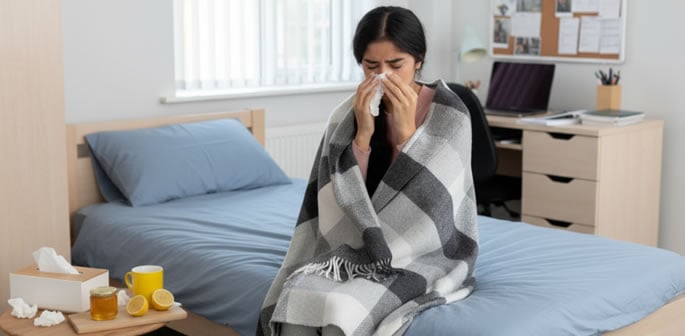"This kind of content can make students feel overwhelmed"
As the new university term starts, freshers’ flu is on the minds of parents and students.
For many teenagers, it will be the first time they live away from home.
But for parents, they may wonder if their children will eat properly, sleep enough, or catch the dreaded virus.
While parents cannot control what happens after drop-off, experts say there are practical tips to help students stay healthy.
According to Supplement Hub, concern has grown in 2025, leading to a 5,000% rise in searches for ‘freshers’ flu’ in the UK over the last month.
Despite many students becoming unwell during the term’s start, experts urge caution against scaremongering. They stress that misinformation often increases anxiety.
Stephen Dowd, Supplement Hub’s Marketing Manager, explained: “Social media is flooded with worst-case scenarios, often shared by people who aren’t medical professionals.
“This kind of content can make students feel overwhelmed before they’ve even arrived on campus.
“The truth is, freshers’ flu is usually mild, manageable and short-lived, and there are simple, affordable ways to support your immune system as you adjust to student life.”
Experts say that while students will ultimately make their own choices, arming them with advice gives them the best chance of staying healthy.
Parents cannot monitor diet or nutrition from afar, but small reminders can help. Supplement Hub recommends realistic encouragement rather than strict rules:
“You don’t need a perfect diet. Just try to make sure it includes fruit, vegetables and protein where you can.”
Sleep is also vital for health. Supplement Hub advises balance rather than perfection.
“Your immune system relies on eight hours of sleep.
“However, this is easier said than done and it’s fine for them to enjoy late nights during freshers’ week, but try to encourage them to balance them out with proper rest in between.”
Hydration is another key area. A reusable water bottle, such as the trendy Stanley cup, could encourage students to drink more, particularly if alcohol intake rises.
Stephen added:
“You can’t out-supplement three hours of sleep and a Pot Noodle.”
But he noted that supplements can provide support.
“If we had to recommend just three essentials to help combat freshers’ flu and support your immunity health more generally, we’d suggest: A good multivitamin – a simple and effective way to cover general nutritional gaps for students. One a day is enough.
“During the autumn and winter, you need to get vitamin D from your diet because the sun is not strong enough for the body to make vitamin D.
“If your diet isn’t as nutrient-packed as it could be, vitamin D supplements are key, especially for those starting university in autumn. We recommend 2000IU per day.”
Zinc is also recommended as it can support immunity short term.






























































